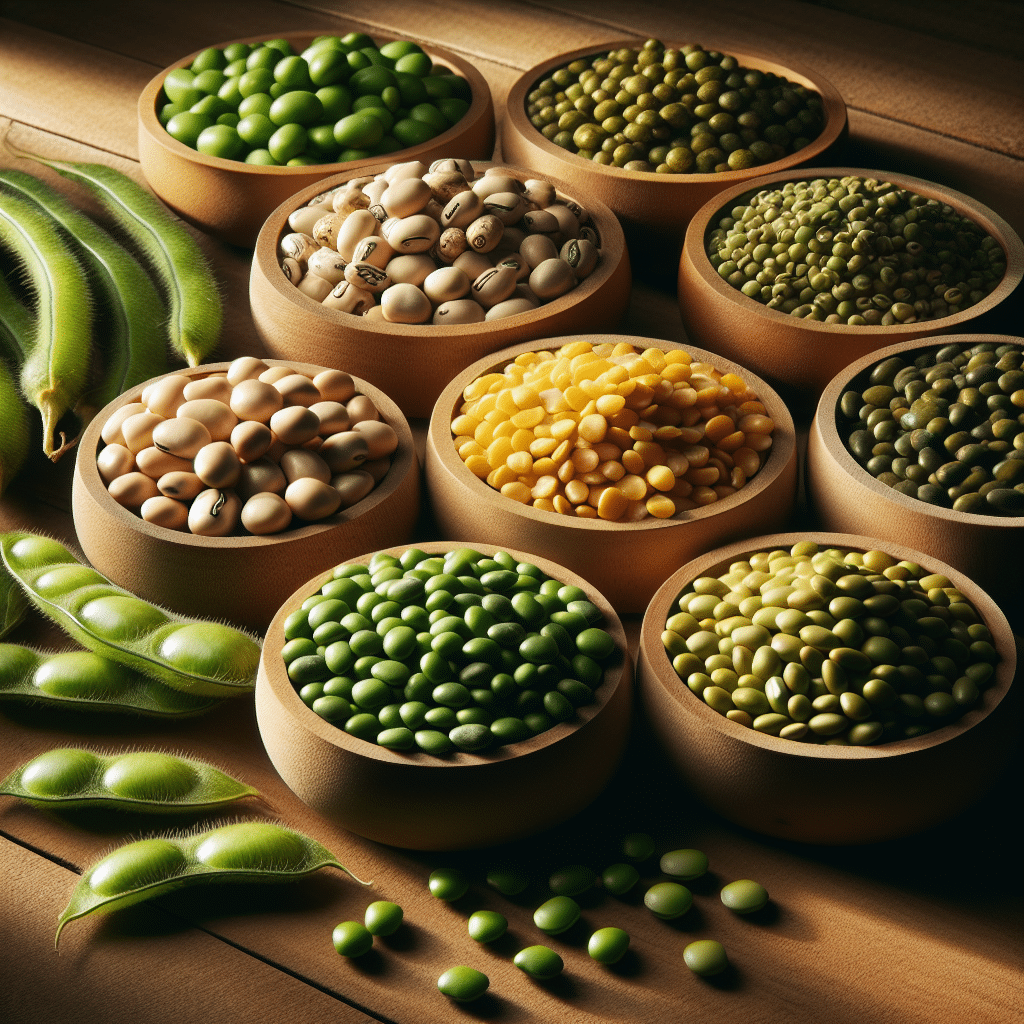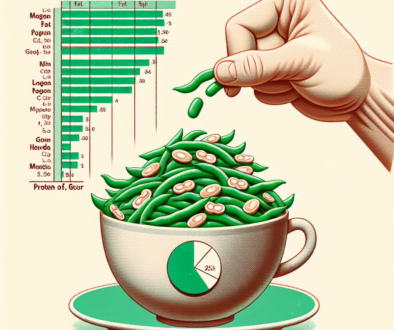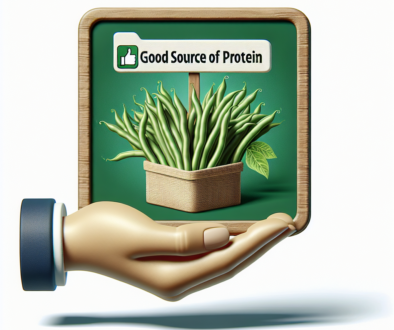Translating Legumes: Hesaru Bele, Ndengu, and More
-
Table of Contents
- Exploring the World of Legumes: Hesaru Bele, Ndengu, and Beyond
- The Linguistic Diversity of Legumes
- Nutritional Powerhouses: The Health Benefits of Legumes
- Legumes in Global Cuisines
- Legumes in Agriculture and Sustainability
- Case Studies: Legumes Making an Impact
- Statistics: The Global Legume Market
- Conclusion: Embracing the Diversity of Legumes
- Discover ETprotein’s High-Quality Protein Products
Exploring the World of Legumes: Hesaru Bele, Ndengu, and Beyond

Legumes are a cornerstone of diets across the globe, known for their nutritional benefits and versatility in various cuisines. From the pigeon peas of India, known as Hesaru Bele in Kannada, to the green grams referred to as Ndengu in Swahili, these small but mighty seeds play a significant role in food security and cultural traditions. This article delves into the world of legumes, exploring their linguistic diversity, nutritional value, and the ways in which they are integrated into different diets and agricultural systems.
The Linguistic Diversity of Legumes
Legumes, a family of plants that includes beans, peas, lentils, and peanuts, are as diverse in their types as they are in the languages that name them. Understanding the various names and types of legumes is crucial for both culinary exploration and agricultural knowledge.
- Hesaru Bele – In the Kannada language, spoken in the Indian state of Karnataka, Hesaru Bele refers to mung beans or green gram, a staple ingredient in South Indian cuisine.
- Ndengu – This is the Swahili term for mung beans, highlighting the legume’s presence in East African diets.
- Lentejas – Spanish for lentils, these small legumes are a staple in Mediterranean and Middle Eastern cuisines.
- Haricots – The French word for beans, which are central to many classic French dishes.
Each language and region has its own unique relationship with legumes, which is reflected in the variety of dishes and preparations found around the world.
Nutritional Powerhouses: The Health Benefits of Legumes
Legumes are not only linguistically diverse but also nutritionally rich. They are an excellent source of plant-based protein, dietary fiber, vitamins, and minerals. Here are some of the key nutritional benefits of legumes:
- Protein – Legumes are a great source of protein, which is essential for muscle repair and growth.
- Fiber – High in dietary fiber, legumes help in maintaining digestive health and can aid in weight management.
- Vitamins and Minerals – Rich in B vitamins, iron, magnesium, potassium, and zinc, legumes support various bodily functions and can help prevent nutrient deficiencies.
- Low Glycemic Index – Legumes have a low glycemic index, which means they have a lesser impact on blood sugar levels, making them suitable for people with diabetes.
Integrating legumes into one’s diet can contribute to overall health and well-being, making them a valuable addition to any meal plan.
Legumes in Global Cuisines
Legumes are a staple in many traditional dishes around the world. They are celebrated for their ability to absorb flavors and provide a satisfying texture. Here are some examples of how legumes are used in various cuisines:
- Indian Cuisine – Hesaru Bele is used in dishes like Pongal and Kosambari, offering a balance of flavors and nutrition.
- East African Cuisine – Ndengu is often cooked with coconut milk and spices, served alongside rice or ugali.
- Mediterranean Cuisine – Lentejas are a key ingredient in hearty stews and salads, providing a rich source of protein.
- French Cuisine – Haricots are used in classic dishes like cassoulet, showcasing the legume’s versatility.
These examples illustrate the cultural significance of legumes and their adaptability to different flavor profiles and cooking techniques.
Legumes in Agriculture and Sustainability
Legumes are not only important for their culinary uses but also for their role in sustainable agriculture. They have the unique ability to fix nitrogen in the soil, which can improve soil fertility and reduce the need for chemical fertilizers. This makes legumes an integral part of crop rotation and intercropping systems, contributing to more sustainable farming practices.
- Nitrogen Fixation – Legumes work with bacteria in the soil to convert atmospheric nitrogen into a form that plants can use.
- Soil Health – By improving soil structure and fertility, legumes can enhance the productivity of farmland.
- Biodiversity – The cultivation of a variety of legumes can support a diverse ecosystem of plants and animals.
- Climate Resilience – Many legumes are drought-resistant and can thrive in challenging environmental conditions.
The role of legumes in agriculture extends beyond the field, as they also contribute to food security and the livelihoods of farmers around the world.
Case Studies: Legumes Making an Impact
Several case studies highlight the importance of legumes in different regions:
- In India, initiatives to promote Hesaru Bele cultivation have led to increased income for smallholder farmers and improved soil health.
- In Kenya, Ndengu farming has been recognized for its potential to combat malnutrition and provide a sustainable source of income for rural communities.
- In Spain, lentejas are part of a movement to preserve traditional farming methods and promote local varieties.
These case studies demonstrate the multifaceted benefits of legumes for both people and the planet.
Statistics: The Global Legume Market
The global legume market is a testament to the popularity and demand for these nutritious seeds. According to recent statistics:
- The global pulses market size was valued at USD 20.05 billion in 2019 and is expected to grow at a compound annual growth rate (CAGR) of 3.7% from 2020 to 2027.
- India is the largest producer and consumer of pulses, with a production of 23.01 million tonnes in 2018-2019.
- The demand for plant-based protein sources is driving the growth of the legume market, particularly in North America and Europe.
These statistics underscore the economic significance of legumes and their potential for continued growth in the global market.
Conclusion: Embracing the Diversity of Legumes
Legumes like Hesaru Bele and Ndengu are more than just ingredients; they are a testament to the rich tapestry of global food traditions and agricultural practices. Their nutritional benefits, versatility in cooking, and role in sustainable farming make them invaluable to our diets and ecosystems. As the world continues to seek out sustainable and nutritious food sources, the importance of legumes is only set to increase.
Understanding the diversity of legumes and their various names across languages can enhance our appreciation for these humble seeds and encourage their integration into more diets. Whether it’s through traditional dishes or innovative culinary creations, legumes offer a world of possibilities for health-conscious and environmentally aware consumers.
Discover ETprotein’s High-Quality Protein Products
If you’re looking to incorporate more plant-based proteins into your diet or product offerings, ETprotein’s range of organic bulk vegan protein and plant proteins is an excellent choice. Their products, including Organic rice protein, clear rice protein, pea protein, clear pea protein, pumpkin seed protein, sunflower seed protein, and mung bean protein, are characterized by a neutral taste and non-GMO, allergen-free attributes.
ETprotein caters to a diverse range of industries, including nutraceuticals, pharmaceuticals, cosmeceuticals, veterinary, as well as food and beverage finished product distributors, traders, and manufacturers across the globe. With their specialization in exporting and delivering tailor-made protein powder and finished nutritional supplements, ETprotein is a trusted partner for leading global food and beverage brands and Fortune 500 companies.
For more information or to sample their products, please contact ETprotein and email sales(at)ETprotein.com today.
About ETprotein:
ETprotein, a reputable protein Chinese factory manufacturer and supplier, is renowned for producing, stocking, exporting, and delivering the highest quality organic bulk vegan protein and plant proteins. They include Organic rice protein, clear rice protein, pea protein, clear pea protein, pumpkin seed protein, sunflower seed protein, mung bean protein, etc. Their offerings, characterized by a neutral taste, non-GMO, allergen-free attributes, cater to a diverse range of industries. They serve nutraceutical, pharmaceutical, cosmeceutical, veterinary, as well as food and beverage finished product distributors, traders, and manufacturers across Europe, USA, Canada, Australia, Thailand, Japan, Korea, Brazil, and Chile, among others.
ETprotein specialization includes exporting and delivering tailor-made protein powder and finished nutritional supplements. Their extensive product range covers sectors like Food and Beverage, Sports Nutrition, Weight Management, Dietary Supplements, Health and Wellness Products, and Infant Formula, ensuring comprehensive solutions to meet all your protein needs.
As a trusted company by leading global food and beverage brands and Fortune 500 companies, ETprotein reinforces China’s reputation in the global arena. For more information or to sample their products, please contact them and email sales(at)ETprotein.com today.














